We have a particular fondness for post-apocalyptic stories and films here. I'd go into detail about their specific appeal, but that would pre-empt an article that's currently being written (and is seriously overdue) on this very subject that we hope to post in the next few weeks. With The Walking Dead finding an audience far beyond the horror faithful and gaming world in a virtual frenzy at the possibility that the latest installment in the post-nuclear action-adventure Fallout game series will be soon be announced, it's clear we're not alone in our somewhat morbid enthusiasm for the end of the world as we know it. With Mad Max: Fury Road currently carrying the torch for big budget, action-driven, post-apocalyptic cinema, Slarek picks five somewhat less expensive, less widely seen but compelling tales of precarious survival in a post-catastrophe world.
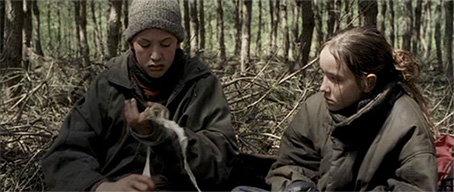
Le temps du loup / Time of the Wolf (Michael Haneke, 2003)
Given that Benny's Video and Funny Games director Michael Haneke has something of a fondness for exploring the darker aspects of human nature, it's perhaps not surprising that the picture he paints of a post-apocalyptic world is as bleak as anything in his downbeat oeuvre. The exact cause of the societal breakdown that robs middle class Anne of her husband and casts her and her two children adrift in a world in which anarchy now reigns is never specified and is ultimately unimportant. Like all good post-apocalypse films worth their salt, armageddon itself is ultimately a narrative McGuffin, as the film's real focus is the affect that the subsequent breakdown of civilisation has on the survivors, and how all concepts of community and empathy are reshaped by our innate desire to survive at all costs. It's unlikely to put a smile on anyone's face, but does offer up plenty of allegorical food for thought.
Le temps du loup is still available on UK DVD from Artificial Eye and can be picked up at a bargain price.
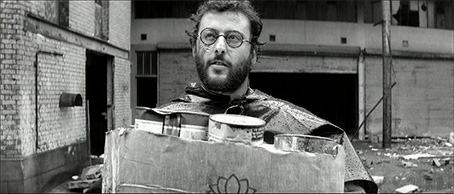
Le dernier combat / The Last Battle (Luc Besson, 1983)
Luc Besson's first feature is in some ways his most distinctive, a captivating portrait of an oddball collection of individuals who eke out an existence in the tattered remains of a post-apocalyptic world. With no dialogue to fall back on for exposition or character building, Besson tells his tale in purely cinematic terms, drawing on the building blocks of silent cinema and relying heavily on the expressive performances of a delightful cast, who include Pierre Jolivet, Jean Bouise, Fritz Wepper and a relative newcomer named Jean Reno. Handsomely shot in vibrant scope monochrome by early Besson regular Carlo Varini and peppered with moments of offbeat humour, it's a bold, consistently intriguing and impressively assured debut.
Le dernier combat is available on UK Blu-ray from Studiocanal. You can read our review here.
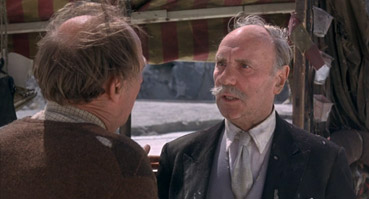
The Bed Sitting Room (Richard Lester, 1969)
Post-apocalyptic Britain viewed through blackly comic surrealist eyes, Richard Lester's vividly cinematic adaptation of the play by Spike Milligan and John Antrobus is a gorgeous creation and a time capsule showcase for British comic (and dramatic) talent of its day. In the post-nuclear wasteland that was once London, the remnants of civilisation are maintained by a handful of individuals, from the predatory nurse who continues to dish out skewed NHS treatment, to the last surviving representative of the BBC, who visits people at whatever shelter they have cobbled together and reads the news to them from behind a broken television screen. One family have made their home on a still operating underground Circle Line Train, two policemen float above the ground in a balloon and seem to do little except move people along, and radioactive fallout is causing one man to slowly mutate into a bed sitting room. Gorgeously photographed by Dick Bush and employing a number of real locations, its humour is underscored by a genuinely unsettling sense of horror and tragedy.
The Bed Sitting Room can be found on UK DVD and Blu-ray in one sublime package as part of the BFI's Flipside strand. Read our review of the DVD here.
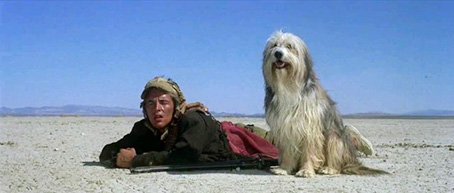
A Boy and His Dog (L.Q. Jones, 1975)
A film adaptation of the novel of the same name by noted science fiction writer Harlan Ellison, this was one of only two features directed by busy character actor L.Q. Jones, who tends to be remembered for his supporting roles in a trio of classic Sam Peckinpah westerns. A young Don Johnson plays Vic, an illiterate survivor of a nuclear holocaust whose only companion is an intellectually superior dog named Blood, who is able to converse with him telepathically. Having spent years in the wasteland chasing women and dodging scavenger gangs, Vic is lured to a subterranean community, a twisted recreation of small town society led by the dictatorial Lou Craddock, wonderfully played by Jason Robards. Not a film that set the box office alight on its original release, it has over the years gained a sizeable cult following and boasts one of the best performances by a dog you're likely to see.
A candidate for a future Arrow Video release, perhaps? In the mean time your best bet is probably the German Epix Blu-ray, which you should be able to play on an unmodified UK Blu-ray player and which can be picked up at a knock-down price.
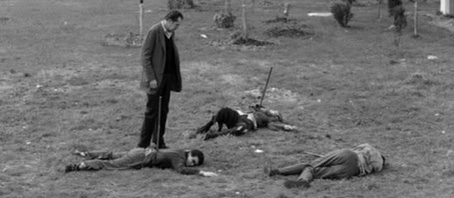
The Last Man on Earth (Ubaldo B. Ragona / Sidney Salkow, 1964)
The first and for my money best of the three film adaptations (so far) of Richard Matheson's dystopian masterpiece, I am Legend. Vincent Price – in one of his finest performances – plays Dr. Robert Morgan, the only apparent survivor of a plague that has wiped out most of humanity and transformed the rest into vampiric zombies. Chronicling Morgan's day to day existence in sobering but oddly gripping detail, the film evolves into a haunting study of isolation and loneliness, one that George Romero himself has quoted as an influence on his seminal 1968 zombie classic Night of the Living Dead.
Currently available DVD versions of the film are apparently of variable quality, and there's even a colourised version available in the US. Oh, the horror. Another one for the Arrow restoration wish list, I'd say. |